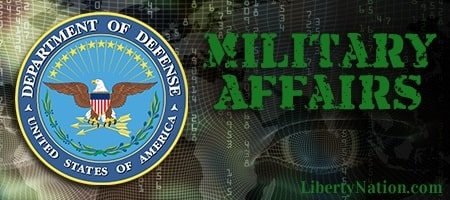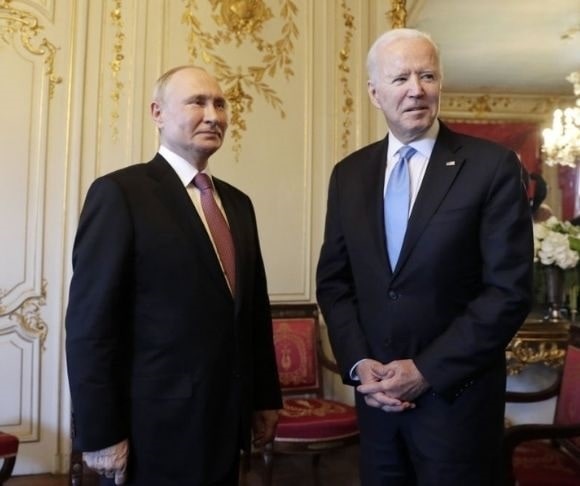Presidents Biden and Putin talked on the phone Thursday, Dec. 30 to discuss the “tense” environment in Europe, and the January 9-13 scheduled meetings between Russia, NATO, U.S., and E.U. officials. It’s not clear if new issues were raised, but Russia’s continuous threats against Ukraine, the former Soviet Bloc country, were front and center in the conversation. Liberty Nation covered the previous secure video call and found the National Security Advisor reported little of substance coming from it. But a new year is here, and resolution of the Kremlin-induced crisis on Ukraine’s border could be in the offing.
As has been the case in the previous June summit in Geneva and the secure video call in early December, Russia’s President Vladimir Putin seems to be driving the narrative. According to Jenny Leonard and Ilya Arkhipov writing for Bloomberg on the meeting, Mr. Putin requested the call, more than likely to set the stage for the discussions later in the month. Yuri Ushakov, a foreign policy aid for the Kremlin, was upbeat. Ushakov described the Russian chief executive’s reaction as being “pleased with the conversation” as the discussion would prepare the agenda “for the three sets of negotiations on European security next month. Moscow’s foreign policy aid explained:
“This is what we are working for, and for this, our presidents reached an agreement, which is why we are happy and satisfied. Today’s conversation was good, constructive, frank, and it seems to me that it provides not a bad, even in fact a good basis for the start of negotiations.”
For the Biden team, a less conciliatory message from the White House was that the U.S. president “urged Russia to de-escalate tensions with Ukraine. He made clear that the United States and its allies and partners will respond decisively if Russia further invades Ukraine.” According to a Newsweek account, Jen Psaki, the White House press secretary, said, “President Biden reiterated that substantive progress in these dialogues can occur only in an environment of de-escalation rather than escalation.” However, the U.S. president warned his counterpart during the call “about the possibility of additional sanctions if Russia escalates the situation in Ukraine.” Putin responded by saying such action would break ties between the two nations, according to Ushakov.
The New York Times coverage of the two presidents’ conversation explained that “Mr. Putin repeatedly accused the United States and NATO nations of placing offensive weapons near Russia’s borders, imperiling the country’s security.” This accusation has confused NATO and U.S. officials since there are no such weapons at or near the Russian border.
At the same time, it is interesting timing that Moscow should announce the successful launch of hypersonic missiles. Reuters reported Russia had “test-fired around 10 new Tsirkon hypersonic cruise missiles from a frigate and two from a submarine.” President Putin called the weapon “a new generation of unrivaled arms systems … a big event in the country’s life.” What was unsaid but implied was do not forget that Russia is a formidable military adversary if it needs to be.
 If the Kremlin’s purpose for requesting the phone call was to allow both sides to reiterate each other’s position, the effort was probably successful. If either side thought progress would be made with some agreement reached on major issues like the U.S. and NATO providing guarantees that Ukraine would not be let into the NATO alliance, that did not happen. That’s not to say other motives might have been in play for Moscow.
If the Kremlin’s purpose for requesting the phone call was to allow both sides to reiterate each other’s position, the effort was probably successful. If either side thought progress would be made with some agreement reached on major issues like the U.S. and NATO providing guarantees that Ukraine would not be let into the NATO alliance, that did not happen. That’s not to say other motives might have been in play for Moscow.
Again, from Bloomberg, “Putin requested the talks — the second such conversation the two leaders have held this month — and by successfully persuading his U.S. counterpart to do so, may have been seeking to bolster his standing both at home and abroad, according to analysts.” The Russian leader is a clever guy. He created the crisis by staging up to 100,000 combat forces on Ukraine’s eastern border that prompted two conversations with President Biden and forced negotiations to address Russia’s grievances.
What the Russian leader’s true purpose is remains unclear. However, signs suggest Putin will posture, puff, and threaten — but stop short of invading anywhere.” Of course, the Kremlin may see the U.S. leader as irresolute and weak. Still, Moscow’s leadership cannot be sure NATO and western Europe won’t carry out its threats of slapping Russia with crippling economic sanctions if it invades Ukraine.
The views expressed are those of the author and not of any other affiliation.
~ Read more from Dave Patterson.





